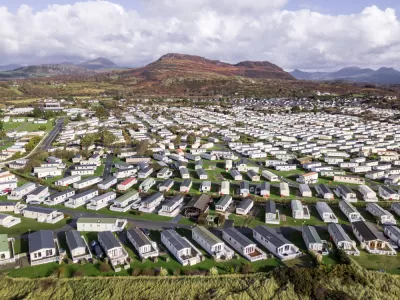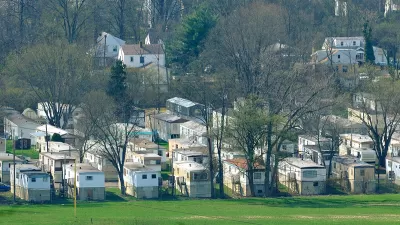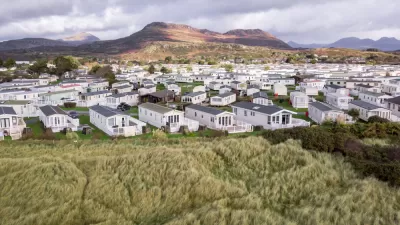Longtime residents of mobile home parks are seeing their land rents go up as corporate investors seek to increase profits, aided in part by federally-backed loans.

Mobile home parks have long served as an affordable option for homeownership for many Americans, with 3 million households residing in manufactured home communities around the country. But more recently, big investors are buying up these parks and raising the land rent, leading to eviction fears for many low-income residents who own their home, but not the land it sits on. Sylvie Douglis reports on the changes affecting residents as ownership of mobile home parks shifts from mom-and-pop operations to real estate investors looking to increase profits with higher rents and new utility fees.
Known widely as "mobile" homes, manufactured homes, in fact, rarely move. The cost to relocate a mobile home runs from $5,000 to $10,000, a price point unaffordable to most owners. "In the past few years, hundreds of parks have been bought up by big corporations" looking to make bigger profits. As rents go up, the park's value rises, and "the investor then refinances the mobile home park and takes out a big loan" at a low interest rate–largely thanks to federally backed Fannie Mae and Freddie Mac loans. Despite their stated goal of helping more people afford homes, these agencies provided over $5 billion in government-backed loans to big mobile home park investors last year alone.
Meanwhile, residents who want to buy their own land struggle to get federal assistance. Although some states have a "right of first refusal" that gives residents the right to buy a mobile home park when it goes up for sale, "when the residents of a mobile home park want to buy their own park, they almost never get a super cheap loan backed by Fannie and Freddie, generally because the co-ops don't have the cash for a big enough down payment." Changing this, says Andy Danforth, "would change the game. Residents could get easier access to loans at much lower interest rates, so they'd be more able to afford to buy up their own parks. A lot more parks could turn into co-ops."
FULL STORY: Mobile Home Parked

Study: Maui’s Plan to Convert Vacation Rentals to Long-Term Housing Could Cause Nearly $1 Billion Economic Loss
The plan would reduce visitor accommodation by 25,% resulting in 1,900 jobs lost.

Alabama: Trump Terminates Settlements for Black Communities Harmed By Raw Sewage
Trump deemed the landmark civil rights agreement “illegal DEI and environmental justice policy.”

Why Should We Subsidize Public Transportation?
Many public transit agencies face financial stress due to rising costs, declining fare revenue, and declining subsidies. Transit advocates must provide a strong business case for increasing public transit funding.

Paris Bike Boom Leads to Steep Drop in Air Pollution
The French city’s air quality has improved dramatically in the past 20 years, coinciding with a growth in cycling.

Why Housing Costs More to Build in California Than in Texas
Hard costs like labor and materials combined with ‘soft’ costs such as permitting make building in the San Francisco Bay Area almost three times as costly as in Texas cities.

San Diego County Sees a Rise in Urban Coyotes
San Diego County experiences a rise in urban coyotes, as sightings become prevalent throughout its urban neighbourhoods and surrounding areas.
Urban Design for Planners 1: Software Tools
This six-course series explores essential urban design concepts using open source software and equips planners with the tools they need to participate fully in the urban design process.
Planning for Universal Design
Learn the tools for implementing Universal Design in planning regulations.
Smith Gee Studio
Alamo Area Metropolitan Planning Organization
City of Santa Clarita
Institute for Housing and Urban Development Studies (IHS)
City of Grandview
Harvard GSD Executive Education
Toledo-Lucas County Plan Commissions
Salt Lake City
NYU Wagner Graduate School of Public Service





























